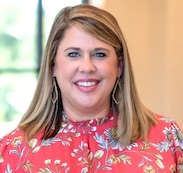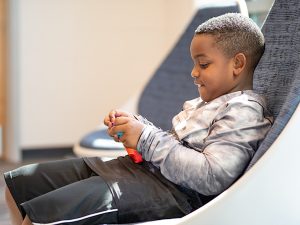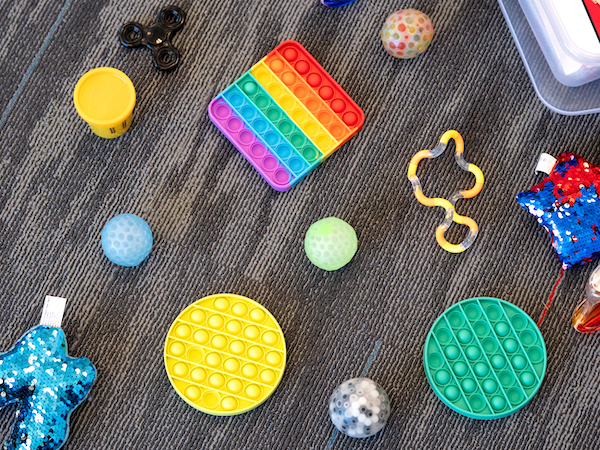 By Cortney McKinney
By Cortney McKinney
Elementary School Counselor
Vestavia Hills City Schools
She was sitting at her desk when I walked in. Her head hung over, eyes staring at her nameplate, and tears quietly streaming down her face. I knelt down beside her and gently put my hand on her back. I asked quietly, “You want to talk about it?”
Lily looked conflicted, as if wanting to speak but not knowing how. She was angry and had just yelled at her teacher when asked why she wasn’t following directions. After some coaxing, we walked to my office and talked over a cup of juice and a handful of m&ms.
Her mom and dad were yelling that morning and she witnessed her dad hit her mom. The arguing was not abnormal at home, but this was the first time Lily had witnessed physical abuse. The idea of focusing on the school day was the furthest thing from her mind.
She was in what we sometimes call the “downstairs brain” (Siegel, 2003), a place our mind escapes to when we are in moments of stress, uncertainty, anxiety, and fear. The question I was led to ponder was, how can I teach Lily (and other children just like her) how to self-regulate in moments of distress? In addition, what can I do to assist teachers in learning more about the importance of self-regulation skills?
What I Discovered through Powerful Conversations
Fast forward a few months to a professional development opportunity I was invited to attend with my school called the Powerful Conversations Network, offered through the Alabama Best Practices Center.
As a part of this learning experience, we were asked to read the book Relationship, Responsibility, and Regulation: Trauma-Invested Practices for Fostering Resilient Learners by Kristen Souers and Pete Hall. (Read Stoney Beavers’ overview here.)
As counselors often do, I wondered if this book would benefit me, or if it were geared towards teachers only and not my line of work. Thankfully, my doubtful thinking could not have been any further from the truth. This book was a wake-up call for me – a call to action and a vessel in which I was able to navigate uncharted waters by talking to teachers about trauma-informed education.
What We’re Doing at Cahaba Heights
As a portion of our homework for PCN, we were asked to pick one of the 3 R’s (relationship, responsibility or regulation) to focus on at our school and develop evidence to show how we were working to improve in that area. At Vestavia Hills Elementary Cahaba Heights, we work diligently to establish relationships and set high expectations for our students that include showing responsibility. One component we had not focused on, however, was in the area of regulation.
While reading through the book and discovering the importance of developing self-regulation skills in students, I felt an urgency to use this homework as a means of providing new and tangible resources for our elementary teachers. I immediately wrote a special project request through our Cahaba Heights Parent Teacher Organization in the amount of $1,000, which was funded.
These funds would eventually be used to purchase mindfulness activities and fidget toys for every general and special education classroom. As a prerequisite, I provided training for all faculty members in August on the “trauma-informed educator” before giving teachers their fidget box. My goal was to provide instruction on the usage of these items in order to ensure they were used as a positive behavioral support as opposed to a distracting toy.
As Dr. Becky Bailey says in her bestselling book Conscious Discipline, “When we focus on behavior without helping children manage their inner states, we are putting out fires but leaving the little fire starter active.” Trauma-informed education seeks to help educators understand that trauma affects all people and is a universal issue that does not discriminate. Regardless of demographic or socioeconomic status, we cannot turn a blind eye to the fact that traumatic events affect us all.
According to the National Council of Behavioral Health, 70% of US citizens experience significant trauma of some kind throughout their lifetime. In his book, The Body Keeps the Score, Dr. Bessel Van der Kolk mentions that the U.S. is one of the most violent, stressed, and traumatized countries in the world. If this is the case, we are forced to ask ourselves, what are we as educators doing to assist children with their mental health?
We are now approximately seven months into our initial implementation of self-regulation kits in the classroom. To keep the momentum going, I spoke to students through large group counseling about “Flipping Your Lid” and used a wonderful resource provided by school counseling consultant Carol Miller to do this.
Our first grade teachers took the initiative to continue this effort in the classroom and used a book called Some Days I Flip My Lid by Kellie Bailey to help students recognize the emotions they are feeling in their body and how to calm down before it’s too late. The fidget boxes are available in each classroom in the cool down corner as a way of self-regulating and – most important – our teachers are ready and equipped to handle whatever emotions come their way.
Being Trauma-Informed Is Part of Our Job
 As a mental health professional, I am passionate about sharing my knowledge with educators and helping teachers understand the importance of trauma-informed education and self-regulation skills. In their book Relationship, Responsibility, and Regulation Souers and Hall say that, “Just as we till the soil and prepare the environment before our garden yields a healthy crop, so too must we tend to our learning environment.”
As a mental health professional, I am passionate about sharing my knowledge with educators and helping teachers understand the importance of trauma-informed education and self-regulation skills. In their book Relationship, Responsibility, and Regulation Souers and Hall say that, “Just as we till the soil and prepare the environment before our garden yields a healthy crop, so too must we tend to our learning environment.”
As educators, isn’t this our job? To love, serve and push our students to reach their full potential? How much more successful might our students be if valuable resources were added into their toolbox to apprehend fear, anxiety, anger, and sadness before it came at a cost? My work and my calling – which I know I share with my school colleagues – is assisting future generations to be safe, loved and whole, and ready to be active citizens who do good in the world.
Photos by Whit McGhee
Cortney McKinney is an elementary school counselor at Vestavia Hills Elementary Cahaba Heights. She has 18 years of successful experience assisting students with their social and emotional well-being. As a reflection of her lifelong love for education, she was selected the district Elementary Teacher of the Year for the 2021-2022 school year.
Cortney has assisted in leading her school in several character education initiatives, earning three Promising Practices awards and becoming a State and National School of Character through Character.Org. A strong believer in mental health awareness, Cortney is passionate about assuring trauma-informed care in the workplace and educating her colleagues on this topic.



0 Comments on "Helping Our Students Discover the Skill of Self-Regulation"